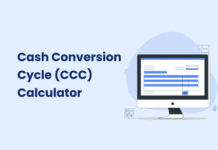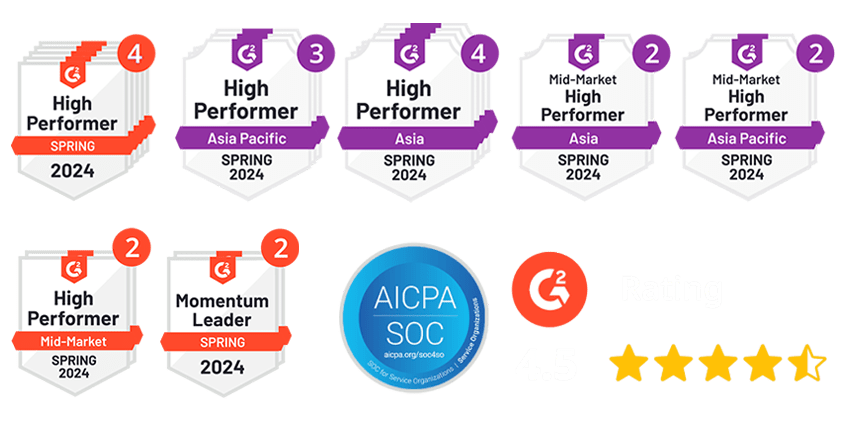Cash flow refers to the money that flows in and out of your business. A healthy cash flow means you can pay employees, suppliers, rent, and taxes and have enough cash available at the right moment.
According to a survey, 59% of businesses struggle to maintain a healthy cash flow. The key challenge for most businesses is understanding how to keep cash on hand while managing day-to-day expenses without affecting liquidity.
You can simplify your cash flow management by paying more attention to your records and reporting. You can plan for the future by managing your cash flow.
What Is Cash Flow Management?
Cash flow management involves monitoring and controlling the inflow and outflow of funds within a company to forecast cash flow needs. It is the ongoing practice of tracking, analyzing, and optimizing the net amount of cash receipts after deducting expenses.
Understanding How Cash Flow Affects Your Business
A lack of adequate cash flow management can be one of the biggest reasons why businesses fail. It is important to accurately monitor your company’s cash flow and understand how it impacts your business.
Your company’s growth potential is also affected by cash flow. Positive cash flow means you have more capital available to invest in new machines or locations for your business expansion plans.
If you have negative cash flow due to late payment issues, and don’t pay your obligations on time, this could impact your ability to obtain a loan for the future. Negative cash flow can also force you to spend your cash reserves on paying creditors instead of investing in your business.
Why is Cash Flow Management Necessary for Businesses?
As the saying goes, Cash is King!
Managing cash flow is the lifeblood of a business and the most vital aspect that keeps the business running. Here are some benefits of effective cash flow management:
- Ensure smooth day-to-day business operations.
- Allow businesses to invest in capital assets to increase production, generate revenue, and serve as a financial buffer when needed.
- Foster the development of a cash reserve, providing the foundation for a sustainable business
- Provide stability during economic downturn and mitigate risks
How to Manage Cash Flow Effectively?
Learning cash flow management is elementary to building your business finances. Let’s take a look at the effective ways to manage cash flow:
Monitor and Analyze Cash Flow Forecast
Making regular and accurate cash flow projections is one of the most important things you can do to warn you of problems before they arise. This will allow you to:
- Monitor your cash flow position anytime
- Identify any fluctuations that could lead to cash shortages
- Plan for your tax payments
- Plan for major expenses
- Provide additional information to lenders
Utilize templates or tools to forecast cash flow accurately and make data-driven decisions. It also helps if you timely review, update, and correct any assumptions you made while creating the forecast.
Create a Budget
Accounting for different types of budgets or expenses can be a great way to keep your business running smoothly. When creating your budget, there are three things you should consider:
Timing
You have the option to make your budget monthly, quarterly, or annually, depending on what is most important or useful. Keep an eye on your budget and make adjustments as your business grows. Be aware of significant differences between the budgeted amount and the actual results.
Costs
Include all fixed expenses and other variable costs. These include rent, insurance, and utilities as well as wages, equipment, and taxes like PAYG (pay as you go) installments or goods and services tax.
Income
- To help you track income and operating expenses, you should estimate your income when you start.
- After your business has been in operation for some time, you can get a better idea about the potential business income.
- This amount should be conservative to allow for some flexibility in the event of unexpected or more expensive expenses.
The results of your budget control strategies will assist you in making business decisions.
Align Customers’ Payment Terms with Vendor’s Terms
Getting paid faster is the key to maintaining a healthy cash flow. If clients have to pay within 30 business days, the terms you negotiate with vendors should be identical. Vendor payments should be made on receipt if client payments are to be made within thirty days. Otherwise, cash flow problems are likely. Never pay in advance. Always pay according to the vendor’s or supplier’s payment terms. Do not pay the vendor until you receive the invoice. Enjoy the 30-day grace.
Offer Incentives for Faster Collection
Another simple way of effective cash flow management is to offer early payment discounts to your customers. If a customer pays you within the first 10 working days you can offer a small discount to them. This creates urgency for customers to pay the bill on time and fosters trust.
Additionally, you can penalize the delinquent customer for making late payments. If the bill is paid after the due date, the interest added ensures that there will be extra funds available when the payment is finally made.
Secure a Bank Business Line of Credit for Future Stability
If your company is growing financially, it’s a good idea to open a bank business line of credit. Banks will not lend money to businesses if they see your business in financial trouble. If you secure the line of credit during times of prosperity, you provide a safety blanket for the future and make it easier to get the line.
Mitigate Potential Risks Beforehand
If you order custom merchandise that you won’t be able to sell to others, ask for deposits. When custom embroidering 100 T-shirts for a local company, make sure you pay the full amount upfront. This prevents you from having 100 shirts that aren’t usable and creates a negative cash flow.
Stay on Top of Inventory Management
If your inventory is still sitting in the store you will not improve cash flow. Keep track of inventory turnover to ensure that products are constantly leaving your store. Talk to the supplier if you are not satisfied with a product or product line. If that fails, then you may be able to sell the product at a discount so that another more profitable item can be placed in its place.
Ditch Traditional Tools and Choose Automation
Working with traditional tools such as legacy systems and spreadsheets can slow down your efficiency in managing cash flow. For instance, using spreadsheets for cash flow management leads to data misplacement, data loss, and incorrect entries. Embracing technology enables you to have granular visibility over data and reports for better decision-making.
With the right technology, you can worry less about cash flow management and focus on high-value tasks. Moreover, utilizing AI-powered reports to create customizable reports and gain visibility over cash flow projections to streamline your business processes and increase efficiency.
FAQ
What is the principle of cash flow management?
The 5 fundamental principles of cash flow management involve optimizing cash inflow which includes – managing accounts receivable, ensuring prompt invoicing, sending timely payment reminders, providing incentives for early payments, and implementing strong credit policies.
What are the 5 cash management tools?
The five cash management tools encompass checking accounts, savings accounts, money market deposit accounts, certificates of deposit, and savings bonds.
What are the main objectives of cash management?
The primary objectives of cash management include controlling cash inflows and outflows to maintain an optimal balance. This approach aims to minimize fund outflows and enhance inflows, ultimately fostering a positive and stable financial position for a company.
What is an example of cash flow management?
A retail business efficiently manages its cash flow by adopting just-in-time inventory practices. By minimizing excess stock and reducing holding costs, the company ensures a steady cash flow. This approach allows for the optimal use of available funds, supporting strategic investments and adaptability to changes in demand.









![Why AI Sales Calls Are Making Good Sales Reps Even Better [2025 Guide] ai sales calls](https://cdn-kmjmp.nitrocdn.com/YvtqmrsiHUxqerlSiZgbfzqqTARWTElr/assets/images/optimized/rev-834053b/blog.peakflo.co/wp-content/uploads/2025/09/65168cf6-3001-4733-8cbc-12d5684cf449-218x150.webp)

































